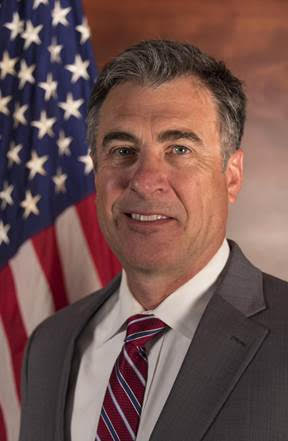
CPSE President Allan Cain
CFO-2009
Allan Cain is finishing his third year as President of the CPSE Board of Directors. Having represented the Town of Cary (North Carolina) Fire Department when they first sought CFAI accreditation in 1999, Allan has been familiar with CPSE for over two decades. His CPSE journey continued with his earning his CFO designation in 2009 and serving on the Commission on Fire Accreditation International for six years, three as Chair. In 2016, he was invited to join the CPSE Board of Directors, becoming President in 2018. This long involvement has given him a unique perspective on the changes that have happened within CPSE over the years.
CPSE Corner: How has CPSE transformed over your time with the organization?
Allan Cain: When I came onto CFAI in 2009, the big focus of the organization was fire department accreditation and we had fewer than 150 departments accredited. Today, there are over 280 departments across the globe that are accredited with almost 300 in the pipeline as registered, applicant, or candidate agencies.
However, we realized that there was more that we could do, so we took the continuous improvement methodology of self-assessment and peer review and crafted professional credentialing so that we could focus on the individual. Professional credentialing has grown incredibly, with the number of credentialed individuals far exceeding the number of fire departments. As a matter of fact, we have just gone over 2,500 credentialed officers, a huge milestone for us.
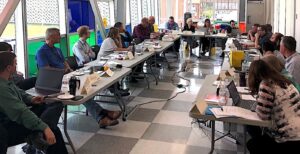 Another area of transformation is how our community has grown over the years. The number of people that are engaged in our work, all of our programs, particularly at the consortium level, has just taken off. When I first came on (in 2009), there were two or three consortiums, now there are 16. When I came on the board there were conversations on how to grow the consortiums because they are our biggest advocates.
Another area of transformation is how our community has grown over the years. The number of people that are engaged in our work, all of our programs, particularly at the consortium level, has just taken off. When I first came on (in 2009), there were two or three consortiums, now there are 16. When I came on the board there were conversations on how to grow the consortiums because they are our biggest advocates.
CPSE Corner: What are some of the big projects that have been completed?
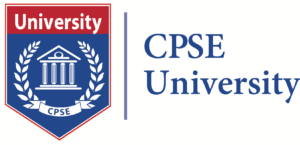 Cain: Realizing that education is so important, whether it is credentialing or accreditation, we decided to create CPSE University. One of the things that became apparent to many of us in the fire service was that no fire school trained you to be, for example, a strategic planner, teaching you to develop objectives and build management systems to align with your strategic plan. We needed a pillar in the organization to teach the fire service to do things that the models call for, so CPSE University was created to teach people about continuous improvement, how to do risk assessments, and other related activities.
Cain: Realizing that education is so important, whether it is credentialing or accreditation, we decided to create CPSE University. One of the things that became apparent to many of us in the fire service was that no fire school trained you to be, for example, a strategic planner, teaching you to develop objectives and build management systems to align with your strategic plan. We needed a pillar in the organization to teach the fire service to do things that the models call for, so CPSE University was created to teach people about continuous improvement, how to do risk assessments, and other related activities.
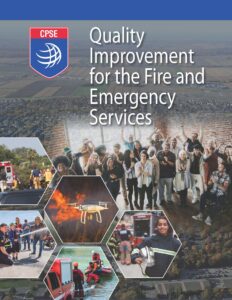 Another is the 10th Edition of the CFAI model. As an organization, we want to practice what we preach – continuous improvement. From the early 1990s to 2020, we have gone from the first edition to the tenth. We regularly and routinely look to improve and adapt over time, incorporate new factors, and the fact that we are going into the Tenth Edition is an example of that.
Another is the 10th Edition of the CFAI model. As an organization, we want to practice what we preach – continuous improvement. From the early 1990s to 2020, we have gone from the first edition to the tenth. We regularly and routinely look to improve and adapt over time, incorporate new factors, and the fact that we are going into the Tenth Edition is an example of that.
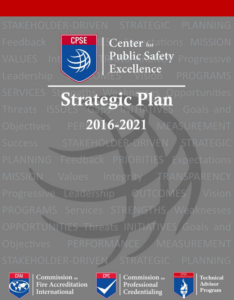 As a board, we are taking a shot at creating our strategic plan. I’m not saying we are updating it, that is something you do every day. We have engaged an outside facilitator to guide us through a new strategic planning process for the organization. Strategic Planning is a key part of the CFAI model, and we encourage others to do it as well. We strive to live and breathe the work that we ask others to do.
As a board, we are taking a shot at creating our strategic plan. I’m not saying we are updating it, that is something you do every day. We have engaged an outside facilitator to guide us through a new strategic planning process for the organization. Strategic Planning is a key part of the CFAI model, and we encourage others to do it as well. We strive to live and breathe the work that we ask others to do.
Our current strategic plan is four or five years old, and it came about when we needed to fix some internal processes, which we have done. But now, with this pandemic, this new external disruptor to the organization, the board will be looking at a two-year horizon. We will also be working to craft a new vision. With Jeff Pomeranz, the City Manager for Cedar Rapids (Iowa), coming in as our new president, we need to articulate a plan to meet his and the board’s views.
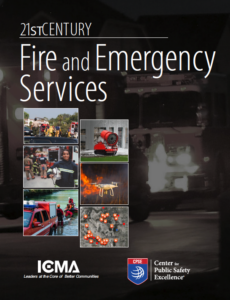 The White Paper (21st Century Fire and Emergency Services) that we developed with the ICMA (International City/County Management Association) was another big accomplishment. When I think of the White Paper, that is indicative of us going back to our roots. What I mean is that the first accreditation program the organization undertook came about as a collaborative effort between the IAFC (International Association of Fire Chiefs) and the ICMA in the early 1990s. That’s how it was born; managers said to fire chiefs, there has to be a better way to evaluate fire departments.
The White Paper (21st Century Fire and Emergency Services) that we developed with the ICMA (International City/County Management Association) was another big accomplishment. When I think of the White Paper, that is indicative of us going back to our roots. What I mean is that the first accreditation program the organization undertook came about as a collaborative effort between the IAFC (International Association of Fire Chiefs) and the ICMA in the early 1990s. That’s how it was born; managers said to fire chiefs, there has to be a better way to evaluate fire departments.
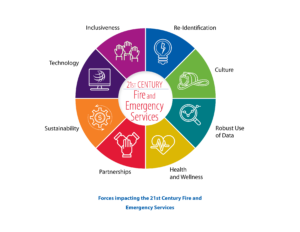 Now fast-forward thirty years to the White Paper which came about through conversations with the ICMA about building something that is looking to the future. It was done through a lot of collaboration and many focus groups across the nation, and the result was eight pillars such as reidentification, robust use of data, health and wellness and many more (you can learn more about the White Paper, download the complete report, or read the individual Critical Issues here).
Now fast-forward thirty years to the White Paper which came about through conversations with the ICMA about building something that is looking to the future. It was done through a lot of collaboration and many focus groups across the nation, and the result was eight pillars such as reidentification, robust use of data, health and wellness and many more (you can learn more about the White Paper, download the complete report, or read the individual Critical Issues here).
CPSE Corner: What are some of the big projects on the horizon?
Cain: One area that we are focusing on is the volunteer fire service. We recognize that they are an important stakeholder that has unique needs, and we are working to be responsive to their needs and help bring them into the continuous improvement model.
COVID-19 has created new challenges for all organizations, CPSE included. As I mentioned, the strategic planning process has started, and will be brought to fruition under the new president, Jeff Pomeranz. We have to determine how we are going to function in this new world environment.
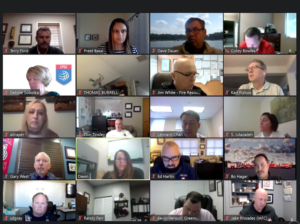 In April, we started what we called Operation Pivot which was an effort to create new operational ways to still meet everyone’s needs in the short term. I equate this to being on a ship that is being attacked, a call to battle stations. We had to staff these battle stations and create new operational ways to do our work because our old operational models requiring face-to-face interaction and travel were not possible. Our educational material has been virtualized and we have just moved the hearings online. We simply cannot afford to not do site visits, education, technical advising, and hearings due to travel restrictions.
In April, we started what we called Operation Pivot which was an effort to create new operational ways to still meet everyone’s needs in the short term. I equate this to being on a ship that is being attacked, a call to battle stations. We had to staff these battle stations and create new operational ways to do our work because our old operational models requiring face-to-face interaction and travel were not possible. Our educational material has been virtualized and we have just moved the hearings online. We simply cannot afford to not do site visits, education, technical advising, and hearings due to travel restrictions.
 This also crosses over to the Excellence Conference. We made the decision that it just would not be possible to hold an in-person conference safely, so we pivoted to doing it entirely online. This is obviously a new undertaking for us, but holding a conference is important not only to us, as an organization, but to our community. CPSE staff has been working hard on developing a virtual experience that will provide much of the information that would normally be available during an in-person conference in the most engaging way possible. We will miss the in-person interaction, but, in this day and age, everyone realizes this is just not possible and is able to make that adjustment.
This also crosses over to the Excellence Conference. We made the decision that it just would not be possible to hold an in-person conference safely, so we pivoted to doing it entirely online. This is obviously a new undertaking for us, but holding a conference is important not only to us, as an organization, but to our community. CPSE staff has been working hard on developing a virtual experience that will provide much of the information that would normally be available during an in-person conference in the most engaging way possible. We will miss the in-person interaction, but, in this day and age, everyone realizes this is just not possible and is able to make that adjustment.
I am incredibly proud of the staff, contractors, and volunteers that are reformatting everything and adapting how we are delivering service. Preet has done a masterful job of guiding all of this, which is a credit to her leadership.
It also shows how CPSE is nimble, able to adjust, and is able to walk-the-walk and talk-the-talk that we encourage our organizations to do. We have a relatively small paid staff, and even though we are almost 25 years old, we are still well-structured to act and function and think like entrepreneurs. When you employ that type of thinking, you have to be nimble, and this aligns very well with fire departments, especially small to medium ones across the country.
And all of this change was coming, it was just that COVID-19 accelerated the transformation. We have had the ability to do online learning for quite some time, but the pandemic environment made it more palatable for our community and allowed us to pivot to ensure we not only survive but thrive for the long term.
CPSE Corner: Do you see yourself having left a legacy?
Cain: I really haven’t given any thought about a legacy. The last eleven years of my association with the organization, and with all the different roles I have held, outside of my job, I haven’t had a greater professional privilege. Being a part of an organization that has accepted me for who I am, as I am a bit of a different thinker, has been so rewarding.
When people look back, I hope they say that we are better off today because Allan was here with us, but this isn’t to discount the people that came ahead of me. When you have been associated with people like Ronny Coleman or Randy Bruegman, I’m humbled that I’ve been here too. I’m just so proud of the organization and the people that have made it all happen.
